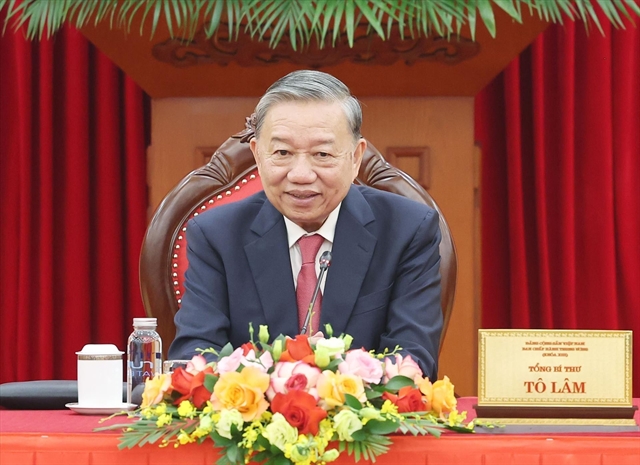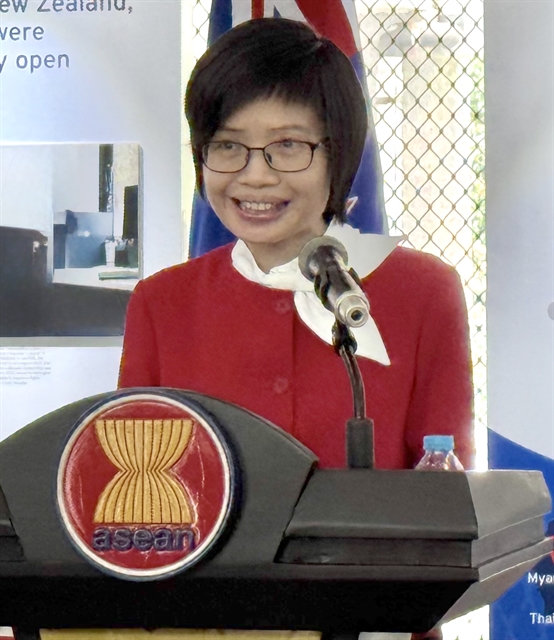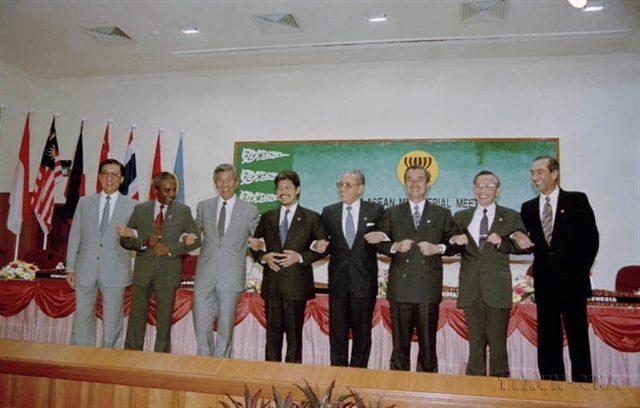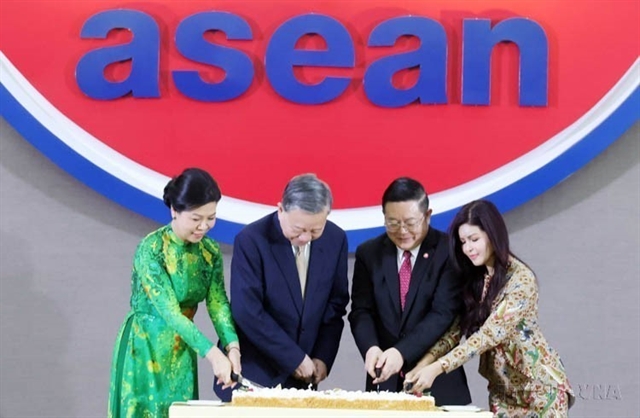 Politics & Law
Politics & Law

 |
| Tôn Thị Ngọc Hương, permanent representative of Việt Nam to ASEAN. VNA/VNS Photo |
July 28, 1995 marked a significant milestone in Việt Nam’s regional and international integration when the country became the seventh member of the Association of Southeast Asian Nations (ASEAN). On this occasion, Ambassador Tôn Thị Ngọc Hương, permanent representative of Việt Nam to ASEAN, speaks about Việt Nam's contributions to the development of the regional bloc over the past three decades.
How would you evaluate Việt Nam’s contributions to ASEAN over the past 30 years?
Việt Nam’s 30-year journey with ASEAN reflects its deepening integration and responsible contributions towards a united, strong and resilient bloc.
By gradually learning, adapting and participating with a proactive and constructive spirit, Việt Nam has joined fellow member states in shaping ASEAN’s development path and its cooperation processes.
Việt Nam has not only listened, but also connected; not merely accompanied, but actively reconciled differences and amplified common ground among member states and between ASEAN and its partners.
These efforts have contributed significantly to maintaining ASEAN’s unity and centrality in an increasingly volatile world.
 |
| ASEAN Foreign Ministers and ASEAN Secretary-General Dato Ajit Singh welcome Việt Nam to the bloc in an admission ceremony held in Brunei on July 28, 1995. VNA/VNS Photo Trần Sơn |
Thanks to Việt Nam’s proactive efforts, the idea of an ASEAN-10, bringing together all Southeast Asian nations, was realised with Laos and Myanmar joining in 1998, and Cambodia in 1999.
This unified ASEAN gained a new regional standing, enabling member states to overcome past divisions and jointly promote cooperation, expand external relations and become a central force in regional dialogue and cooperation frameworks.
Việt Nam has successfully fulfilled numerous rotating responsibilities in ASEAN. As host of the sixth ASEAN Summit in 1998, only three years after joining, Việt Nam and fellow members steered ASEAN through the Asian financial crisis, adopted the Hanoi Action Plan and sustained the momentum of regional cooperation and integration, helping realise the ASEAN Vision 2020.
As chair of the 34th ASEAN Standing Committee in 2000–2001, Việt Nam advanced concrete measures to implement the Initiative for ASEAN Integration (IAI) and adopted the Hanoi Declaration on Narrowing the Development Gap for a Close ASEAN.
During its ASEAN Chairmanship in 2010, Việt Nam facilitated ASEAN’s transformation from vision to action, helped expand the East Asia Summit and established the ASEAN Defence Ministers’ Meeting Plus, reinforcing ASEAN’s central role in regional architecture.
In 2020, amid the outbreak of COVID-19, Việt Nam acted swiftly and flexibly as ASEAN Chair to promote effective responses and proposed several key initiatives, including the COVID-19 ASEAN Response Fund, ASEAN Regional Reserve of Medical Supplies for Public Health Emergencies, the ASEAN Comprehensive Recovery Framework and its Implementation Plan, the ASEAN Declaration on ASEAN Travel Corridor Arrangement Framework, and the ASEAN Centre for Public Health Emergencies and Emerging Diseases.
Việt Nam also successfully served as a coordinator for ASEAN's relations with key partners such as with China, the EU, India, Japan and South Korea.
Currently, Việt Nam is coordinating ASEAN’s relations with the UK and New Zealand for the 2024–2027 term.
In helping shape ASEAN’s development direction, Việt Nam has played a vital role in setting strategic goals and key decisions.
This includes drafting major documents such as the ASEAN Vision 2020, the ASEAN Charter, the ASEAN Community Vision 2025 and 2045, and various master plans on ASEAN connectivity and development gap reduction.
In a context of increasing global and regional complexity, Việt Nam remains an active contributor to setting rules and principles that shape the regional rules-based order.
Together with ASEAN, Việt Nam helps safeguard peace, security and stability while promoting dialogue and cooperation, strengthening ASEAN-led mechanisms and forums.
This creates favourable conditions for national development goals and builds an inclusive and equitable cooperation framework at the national level, grounded in the UN Charter, ASEAN Charter and international law.
 |
| Việt Nam Communist Party General Secretary Tô Lâm (2nd from left), Secretary-General of ASEAN Kao Kim Hourn (2nd right) and their spouses cut a cake commemorating Việt Nam's 30-year membership in ASEAN in Indonesia in March. VNA/VNS Photo Thống Nhất |
How will Việt Nam continue to contribute to ASEAN and what opportunities lie ahead for deeper economic integration and national development?
ASEAN membership has opened up vast opportunities for Việt Nam – from securing a peaceful and stable regional environment to expanding economic cooperation, enlarging markets, deepening international integration and enhancing Việt Nam’s role and stature.
ASEAN is currently Việt Nam’s fourth-largest export and third-largest import partner.
Bilateral trade has grown nearly 25 times, from US$3.26 billion in 1995 to $83.6 billion in 2024.
ASEAN’s network of free trade and regional deals like the Regional Comprehensive Economic Partnership (RCEP) help Việt Nam gain opportunities to expand markets, boost export growth and attract foreign investment.
Vietnamese citizens also benefit directly from ASEAN cooperation programmes across the ASEAN Community’s pillars, including transnational crime prevention, maritime cooperation, sustainable development, environmental protection, climate change response, disaster mitigation, education, labour, entrepreneurship, healthcare, green transition, digital transformation, and smart agriculture.
ASEAN also offers a critical multilateral environment for strengthening the international integration capacity of Việt Nam’s foreign affairs personnel.
Through ASEAN frameworks and rotating responsibilities, Việt Nam can expand, diversify and deepen relations with many key global powers and strategic centres.
As ASEAN pursues its Vision 2045, aligned with Việt Nam’s aspirations for a rising era and marking the 100th anniversary of the country’s founding, we will continue to take a proactive and responsible approach, exercising leadership while harmonising national interests with the collective interests of the ASEAN Community.
This will help generate synergies and foster a dynamic, sustainable ASEAN alongside our fellow members.
We must effectively leverage the economic dynamism of ASEAN, which is expected to become the world’s fourth-largest economy by 2030, and the open economic space created through trade and investment agreements, especially the RCEP, which covers over $26 trillion in combined GDP and nearly 30 per cent of the world’s population.
At the same time, we must seize opportunities in emerging cooperation trends such as green and digital transformation, technological development, innovation and sustainable infrastructure.
This will position Việt Nam within regional sustainable supply chains, accelerate our international integration and help realise our key development goals.
Could you elaborate on Việt Nam’s current rotating roles in ASEAN amid ASEAN transition to its new Community Vision 2045?
ASEAN is entering a new phase of development with its Community Vision 2045, aiming for a resilient, innovative, dynamic, and people-centred bloc.
Building on three decades of active participation, Việt Nam continues to fulfil important rotating responsibilities with a strong sense of responsibility.
First, Việt Nam currently chairs the IAI Task Force during the 25th anniversary of the initiative. This is a pivotal moment for ASEAN to reflect on lessons learned and shape a roadmap for the next phase.
The IAI Work Plan V for 2026–2030, which will form an integral part of the ASEAN Community Vision 2045, is being developed and expected to be adopted at the 47th ASEAN Summit in late 2025.
As chair, Việt Nam plays a key role in ensuring that the new plan aligns closely with the ASEAN Community Vision’s strategic goals, narrowing development gaps across countries and regions and promoting balanced progress.
Second, Việt Nam is the current coordinator for ASEAN–New Zealand relations for 2024–2027. In 2025, marking the 50th anniversary of ASEAN–New Zealand relations, Việt Nam is working closely with fellow ASEAN members and New Zealand to prepare for the commemorative summit.
The summit is expected to adopt a Joint Vision Statement and launch a new Action Plan for 2026–2030, setting the stage for elevating the relationship to a Comprehensive Strategic Partnership.
Third, Việt Nam will serve as coordinator for ASEAN–United Kingdom relations for 2026–2030. The country is collaborating with the UK to complete the current ASEAN–UK Action Plan for 2022–2026, which has reached a 95 per cent implementation rate.
We are also working to operationalise the ASEAN-UK Foreign Ministers' Joint Statement on Connectivity adopted in 2024 and to plan for the fifth anniversary of the ASEAN–UK Dialogue Partnership in 2026, including the development of a new Action Plan covering 2027 to 2031.
Successfully fulfilling these three important roles amid increasing multilateral challenges will be Việt Nam’s meaningful contribution to ASEAN at a pivotal moment, reinforcing regional integration, ASEAN’s centrality, image and position globally. VNS